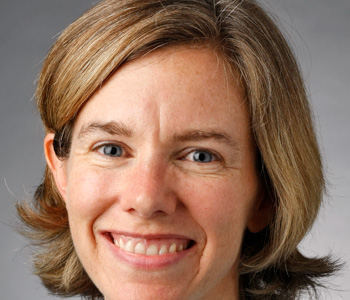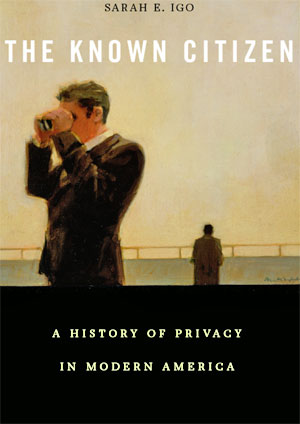
Privacy—I probably need convince no one—looms large in the United States today, sparked by concerns about NSA spying as well as social media profiling, facial recognition software as well as genetic testing. It is the vocabulary Americans reach for to mark the boundary between themselves and the society at large: the government, of course, but also corporations, researchers, marketers, employers, schools, and neighbors. Indeed, for something we think of as by definition cordoned off from public life, privacy courses through U.S. political culture.
My book charts how and why privacy became a fixture—even fixation—of the U.S. public sphere in the twentieth century. The growth of the central state and social institutions is part of the answer, along with the creation of ever-more sophisticated technologies of surveillance. But the larger story I tell is the emergence of a “knowing society,” one that sought to understand, govern, and minister to its members by scrutinizing them in fuller and finer detail—often with the support and cooperation of those same citizens. By pursuing the problem of how Americans would, and should, be known by their own society, I hope to offer a new angle on the contentious career of privacy in modern life.
A knowing society, after all, carried rewards as well as risks. New techniques for rendering individuals legible, from credit reports and CCTV cameras to psychological testing, promised opportunity and security, even self-understanding. But being known too well—through the monitoring of one’s sexual or consumption habits, for instance—could threaten personal autonomy.
This was a delicate calibration. To remain unrecognizable to society’s authorities was in some contexts a sign of privilege. In others, it was a form of disempowerment, with recognition basic to enacting one’s membership in society. Being traceable in a national criminal or DNA database was a different matter than being identifiable to a benefits-granting program like Social Security. In this way, the question of whether one could be known accurately and authentically—and on one’s own terms—animated privacy’s prominence in American public life.
I track American debates over the known citizen, from the era of “instantaneous photography” in the late nineteenth century to our own age of big data. Across the last century and a half, tabloid journalism and new technologies, welfare bureaucracies and police tactics, market research and personality testing, scientific inquiry and computer data banks, tell-all memoirs and social media all posed profound questions about how to fix the line between the modern person and the collectivities to which she or he belonged.
These practices could not help but alter Americans’ ideas about privacy. In entertaining new understandings of what could be asked and what could be said, what could be exposed and what should be disclosed, citizens shifted the contents of “public” and “private.” By the twenty-first century, I contend, they had fundamentally redrawn the borders separating the private from the public self (for the whole story, you have to read the book).
As an historian of ideas, I’m keenly interested in people’s convictions and how they change. I’ve been especially curious about the way ordinary Americans have revised their understandings of the society they lived in. In my first book, for instance, I explored how citizens’ visions of the national public—majorities and minorities, mainstream and fringe—were altered by the sudden influx of popular polls and surveys in the first half of the twentieth century.
Privacy is a fascinating topic for probing how ideas, even deeply cherished ones, shape shift. This is because Americans usually treat it as an essential and unchanging value, if one also always under threat. But a look into the history of how Americans have debated, litigated, and lived privacy over the past century and a half reveals a concept in constant turmoil. Certainly, citizens viewed and wielded privacy differently depending on their status and circumstances, and some could barely access it at all.
Rather than ask what happened to Americans’ privacy—as if it were a stable or measurable thing—I wanted to know why modern citizens talked and thought so much about it. What was that talk really about? What was it doing in political debates and constitutional jurisprudence but also in social criticism, professional protocols, architectural plans, and popular culture? How had it evolved over time? And what might it reveal about the changing texture of both personal and public life?
I found that some of the ways Americans debated the fate of personal privacy in the late nineteenth century often felt surprisingly familiar in the twenty-first. But there have also been striking transformations, which in my view can only be explained by following in the tracks of the known citizen.
One was Americans’ gradual turn from an emphasis on tangible claims to privacy—in the form of property rights and physical space—to intangible ones centered on psychological freedom, decisional autonomy, and personal identity as a more knowing society took root. Another transformation was in the shifting sense of who was entitled to privacy’s refuge. If privacy was a privilege reserved for the “man of reputation” at the outset of my story, it was claimed (although not always successfully) by a much wider array of Americans by the end, including juveniles, patients, soldiers, union members, pregnant women, research subjects, and welfare recipients. The expansion of formal privacy rights and regulations across the twentieth century testified persuasively to the need for protections from those claiming a right to know.
But perhaps the most unexpected development was the way in which the closely guarded secrets of the Victorian era moved out into the open after the 1960s, whether in political, psychological, or pop-cultural form. Although never completely or finally, an older fear of exposure gave way to a premium on transparency. Already known so well, many citizens today are willing to live more openly by embracing new modes of revelation and disclosure.
A reader who picked up The Known Citizen and opened it at random might come across social outrage over candid photographs in the late nineteenth century, prompting a spate of “right to privacy” suits brought by women whose images were used without authorization to advertise flour or soap.
Another might come across the debates triggered by the new Social Security numbers in the 1930s, and the methods of state documentation and tracking they made possible. If that reader flipped a little further ahead, to the middle of the book, she or he might land on arguments over psychological testing in the schools, social research experiments, contraceptive counseling, and early computer data banks—each of which, in one way or another, raised concerns about individual privacy in postwar American society.
A reader who happened instead upon the final chapters would encounter instead the pronounced unease attached to the outflow of personal matters into public venues by the late twentieth century, in the form of early reality television in the 1970s or confessional memoirs in the 1990s. Still a different, and more familiar landscape, of privacy concerns—clouds, data aggregators, retinal scans—would greet the person who turned right to the epilogue.
I would hope such browsers would be intrigued rather than bewildered by this kaleidoscopic array of topics—and by the fact that Americans have employed “privacy” to talk about all of them. If so, they would replicate my own research process. I went looking for privacy talk in the past and found it just about everywhere: in census schedules and public health campaigns, scientific laboratories and suburban design, marketing agencies and welfare bureaus, social movements and therapeutic sessions. By deliberately peering into otherwise unrelated domains in U.S. society, I aimed to piece together a new picture of how and why privacy came to matter so much to modern Americans.
Although my book takes a capacious view of privacy’s history—ranging across topics from photography to policing, research ethics to “outing”—its emphasis may surprise some readers. The Known Citizen is neither a history of the surveillance society nor of the national security state, the two most common frameworks for thinking about privacy in the early twenty-first century. From where I sit, any student of this topic needs to reckon with the fact that citizens have always simultaneously resisted and craved being known, both pursued and dispensed with privacy. This makes the problem of privacy in American life—and the dilemma of the known citizen—both more complex and more mundane than headline-grabbing stories of data mining or government spying allow.
One thing writing this book convinced me of is that privacy in modern America has not been “private” at all. It has instead functioned as a crucial category of public life. Precisely because privacy in the United States has been billed as a personal possession, outside the realm of the state or politics, its history opens up an illuminating window onto the social strains of modern citizenship.
Privacy became a potent language in American life because it helped bridge the tension between expanding claims to personal inviolability and more sophisticated methods of infringing on it. It mediated the tug of war between the desire for anonymity and the longing for recognition, sometimes even within the same person. It was, in short, a tool for navigating an increasingly knowing society—one in which securing the boundary between one’s private affairs and one’s public identity was a routine, and yet urgent, task.
For this reason, I part ways with those who argue that privacy is “dead” or “over”—a common refrain in the past decade (although it first appeared long before that!). Legal and political thinkers, but also ordinary Americans, have regularly remade privacy to meet new conditions. They have done so by rethinking the boundary between themselves and their society. My guess is that they will do so again, even in our own age of social media and big data.
Who has the right to know? What ought to be publicly known? Who and what should remain unknown? These are the questions that American privacy debates sought to settle—at least provisionally—in the past. They are questions we will likely continue to wrestle with for the foreseeable future. I hope this book will inform the discussion.


Sarah E. Igo is an Associate Professor of History and the Director of American Studies at Vanderbilt University. A graduate of Harvard and Princeton, she teaches and writes about modern American cultural and intellectual history. Her first book, The Averaged American: Surveys, Citizens, and the Making of a Mass Public, explored the relationship between survey data—opinion polls, sex surveys, consumer research—and modern understandings of self and nation. Igo’s new book is The Known Citizen: A History of Privacy in Modern America, published by Harvard University Press and featured in her Rorotoko interview.